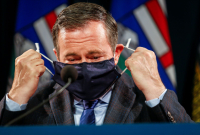Support strong Canadian climate journalism for 2025
FREDERICTON — New Brunswick was placed under a state of emergency Friday as the province's hospitals struggled to keep pace with a surge in COVID-19 infections caused by the highly contagious Delta variant.
The province has recorded 866 new cases so far this month — nearly a quarter of the total reported since the beginning of the pandemic in March 2020.
A senior health official said the province got it wrong in late July when the decision was made to lift all health-protection measures aimed at stopping the spread of the virus.
"All of us in this room right now, with the evidence of this rapid increase in Delta virus in the province, we'll all agree that was not the right decision to make," Dr. Gordon Dow, infectious disease specialist with the Horizon Health Network, told a technical briefing Friday.
"Many other jurisdictions made the very same mistake. Alberta made the mistake, except they made it a month before us. Saskatchewan made the mistake. The United States made the mistake. The U.K. made the mistake. There were a lot of mistakes made."
In late July, the province became the first jurisdiction in Atlantic Canada to drop all of its COVID-19 restrictions.
At the time, some infectious disease experts warned New Brunswick would face a surge in Delta-variant cases in the fall, mainly because of Premier Blaine Higgs' decision to drop mask requirements in indoor public places.
The mask order was reinstated on Wednesday, and on Friday, Higgs introduced a number of other health-protection measures. They include new rules to limit contacts, ensure physical distancing and require certain businesses and events to have vaccination or masking-and-testing policies.
Asked if it was an error to lift all health-protection orders in July, Higgs said that decision was based on the best available advice.
"It was the right thing to do in relation to us getting to see family again and to have summer back with family ... and to get a reprieve," Higgs told a news conference after the briefing. "It's convenient to try and get a gotcha moment here, but with the facts available at the time ... I would have made the same decision that I did."
Higgs, however, then changed his tone and reflected on other big decisions he has made over the years.
"Through my life, there's lots of times, in hindsight, I would have done things differently," he said. "And, yes, this could this be one of them, in hindsight."
Health officials also confirmed Friday the deaths of three more people infected with COVID-19, all of them over the age of 70, bringing the province's total to 52. There were 78 new COVID-19 cases, 59 of which involved people who were not fully vaccinated.
Of the 573 active cases reported Friday, 31 were in hospital, including 15 in an intensive care unit.
As of midnight Friday, the province's new health-protection measures require people to:
— limit their contacts to their household plus 20 consistent contacts
— limit indoor private gatherings to 20 consistent contacts
— maintain physical distancing at outdoor gatherings
— adhere to new business rules that require employees to be fully vaccinated or continuously masked and regularly tested if they work at places where people gather or exercise.
— show proof of vaccination status if entering a place were people gather or exercise, including museums, cinemas, theatres, bingo halls, casinos, amusement centres, arenas, game rooms, pools halls, live entertainment venues, weddings, funerals, gyms and yoga studios.
— follow new rules for faith-based venues, which have the option of either ensuring all participants are fully vaccinated or implementing gathering limits and requiring mask use.
This report by The Canadian Press was first published Sept. 24, 2021.
— By Michael MacDonald in Halifax
The Canadian Press





Comments